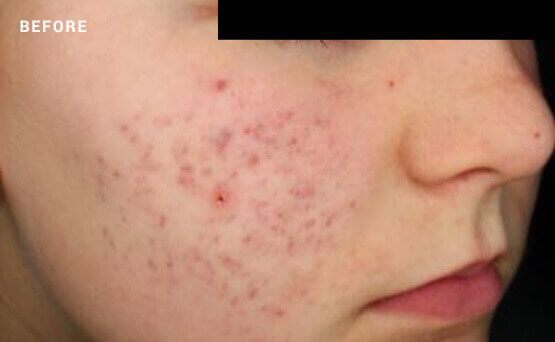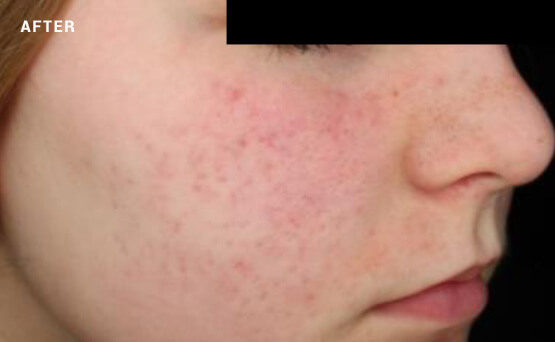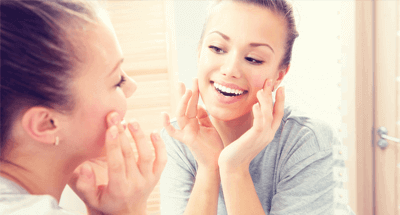As if the acne wasn’t annoying enough, pigmented acne scars and red spots linger like unwanted guests long after the breakouts stop. Why spend time thinking about your skin or trying to mask imperfections? What if your skin looked impeccable 24/7 with zero effort? Well, it can.
Sorry acne scars. IPL doesn’t like you.
IPL (intense pulsed light) is the non-invasive light treatment NuAGE uses to banish acne scars and diffuse redness. While it may sound futuristic, it’s actually a natural way to achieve healthy, even skin, as it works with your own internal healing response.
Acne scars, also known as post-inflammatory hyperpigmentation, are dark or red spots that remain after an acne lesion has healed. When the pore swells from acne, a break occurs in the follicle wall. If the break is deep enough, the redness becomes semi-permanent and indented scars can even occur. The redness is due to the blood cells that pool in the area and then harden in an attempt to heal the infected pore. It can take months or, in many cases, years for the skin to rejuvenate itself and the scar to fade.
IPL heats and softens the abnormal pigment of the scars and breaks it down into smaller particles, which are then eliminated by the body a whole lot faster than they would have been without laser intervention. Not only that, IPL will improve your overall skin tone and restore your glow with no downtime. So toss those useless, slow-moving topical treatments and embrace technology for safe, fast-tracked results.
Book Your FREE Consultation Today in our Vancouver Laser Clinic to See How We Can Help With Your Acne & Acne Scars!
How does laser treatment work?
Monthly Promotions
Shop the latest monthly deal at NuAGE Laser, covering a broad range of treatments.
learn more
FAQ
How many sessions of laser for acne scars will I need?
A: Most patients have about three sessions. Each session is scheduled four weeks apart for optimal healing. In some instances, such as when pigmented acne scars have been present for more than two years, you may require additional treatments.
What areas of the body can be treated with laser removal of acne scars?
A: As if we didn’t mention enough reasons to love IPL, here’s one more: All areas affected by acne and acne scars may be treated. This includes the most common spots such as the face, chest, shoulders and back. We can even treat acne scars on the legs and bikini area due to shaving or waxing.
Why do my pigmented acne scars not go away?
A: During a breakout, white blood cells form around blemishes to heal them. At times, these blood cells harden and then hang out on the skin for an extended period of time creating pigmented acne scars.
Freshly pigmented acne scars can actually be treated with exfoliating techniques like a microdermabrasion facial, chemical peels or at-home exfoliants. However, laser therapy is ideal for removing scars that have been around longer than a year.
Will the acne spots and redness reappear over time?
A: Unfortunately new acne scars may appear with new breakouts and diffuse redness can crop up again with new sun damage. However, both are treatable so ease your mind. In order to prevent redness, be sure to slather on that broad-spectrum sunscreen (minimum SPF 30) on a daily basis.
Rosacea is a chronic skin condition and cannot be cured with any laser or light source. However, its appearance can be improved. Your NuAGE technician will give you all of the details at your consultation.
What does laser removal of acne scars feel like?
A: When the pulse of light is delivered, patients feel a mild heat or pinching sensation. The key word here is mild, so don’t worry. Your NuAGE Laser clinician will apply a cooling gel to keep you nice and comfy. Anesthesia and pain medicine are not required.
How does the laser remove acne scars?
A: The laser does its thing by revving up your body’s own natural healing process. When the pulse of light hits the skin, it causes the cluster of abnormal pigment (blood cells) to break apart. The body then absorbs the pigment. The heating of the blood cells is responsible for the therapeutic effect.




